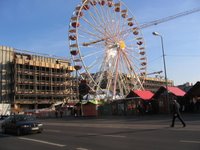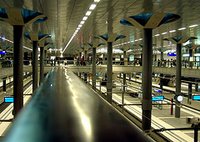It’s time for a small rundown about the themes touched on in here in A New Yorker in Berlin:

First, the Schloss-saga. As discussed in posts from Nov. 19, & 26, Dec. 17, and Jan. 15, the city is struggling to explain where the money will come from to rebuild the Baroque palace that stood on the central Schlossplatz until the East Berlin government blew up its war-damaged remains in 1950. The structure that replaced the Schloss in the 1970s, the German Democratic Republic’s Palast der Republik, is now being removed amidst accusations that there isn’t sufficient funding to build its predecessor/successor.
Not so, says the municipal government, which has produced a new plan to build the Schloss without an attached luxury hotel, without an underground parking lot, and, most importantly, without the signature historical dome rising majestically above its wings. The plan does, however, remain true to its goal of creating a mix of exhibition and museum space for the study of other cultures, an educational space that recreates “the world in the center of Berlin,” to be called the "Humboldt Forum." This latest plan reduces costs enough to begin construction
 perhaps in 2008, and finish perhaps by 2012. There are also suggestions to maintain the river-facing side of the Schloss in the style of GDR architecture to commemorate each era the site has seen. How diplomatic, especially since the left-leaning municipal government isn't quite convinced it wants to contribute to the Forum's coffers.
perhaps in 2008, and finish perhaps by 2012. There are also suggestions to maintain the river-facing side of the Schloss in the style of GDR architecture to commemorate each era the site has seen. How diplomatic, especially since the left-leaning municipal government isn't quite convinced it wants to contribute to the Forum's coffers.As regards so-called "One Euro Jobs" (post Nov. 12), a new federal study (pdf link; for html see the institute's homepage) suggests that this federal initiative to combat Germany's high unemployment actually takes away jobs away rather than creating them, giving jobs on the cheap to those who qualify for such state-mandated labor rather than those who were trained to perform given functions at a higher minimum wage. In other words, the initiative is forming temporary positions for lesser pay rather than permanent opportunities; only 2% of the One Euro Jobs even come with the possibility of long-term employment. One suggestion to fix this situation is to have civil employees watch over and approve the One-Euro administration at job agencies. This could be a good solution; it would also in theory create more jobs.
The great competition between two companies to build jumbo-sized Ferris Wh
 eels (post Dec. 1) is playing out to Western advantage. The Wheel at the old Zoologischer Garten train station is in the lead financially and according to a public opinion poll. However, the poll reports that 52% of those asked want the wheel, a rather slim margin. One wonders if Berliners will look back at the years from 1990-2010 with contentment or with resentment directed at many silly or socially destructive construction projects. While obvious scapegoats like New York’s much-criticized Robert Moses are currently lacking, history might find some. Then again, it depends on how successful the Berlin Republic ends up. As the new positively-slanted Moses exhibit in Queens shows, each era remembers a bit differently.
eels (post Dec. 1) is playing out to Western advantage. The Wheel at the old Zoologischer Garten train station is in the lead financially and according to a public opinion poll. However, the poll reports that 52% of those asked want the wheel, a rather slim margin. One wonders if Berliners will look back at the years from 1990-2010 with contentment or with resentment directed at many silly or socially destructive construction projects. While obvious scapegoats like New York’s much-criticized Robert Moses are currently lacking, history might find some. Then again, it depends on how successful the Berlin Republic ends up. As the new positively-slanted Moses exhibit in Queens shows, each era remembers a bit differently.As reported on Dec. 6, Berlin’s new main train station has not arisen without growing pains, including a spat between architect Meinhard von Gerkan and head of Deutsche Bahn Hartmut Mehdorn, in which the former sued the latter for not following his plans to construct arched roofs in the lower level. To everyone’s surprise, he won the suit—meaning more costs and travel delays for a
 project already marked by such developmental hiccups. Yet from making headlines for the lawsuit, delays, and its much-touted glass roof that ended up unfinished, leaving first-class passengers in the rain, the Hauptbahnhof has now come to define debacle, making headlines for being simply awful. When the weather system Kyrill plowed through Germany on January 18, its hurricane-force winds knocks loose a steel girder on the station’s façade. In turn, the girder’s fall damaged a staircase and left structural weakness such that plate glass started to loosen, and the entire station was evacuated, stranding thousands of travelers. It re-opened the following day, only to close again 48 hours later due to heavy winds threatening the damaged structure. These embarrassing closures are taking place amidst the revelation that the apparently faulty structure actually cost 1.2 billion euros to build, not the single billion Deutsche Bahn had reported. Repairs will naturally also be costly. If only von Gerkan’s arched roofs had been built—then at least customers retreating from the station, on either day, would have had something to admire on the way out.
project already marked by such developmental hiccups. Yet from making headlines for the lawsuit, delays, and its much-touted glass roof that ended up unfinished, leaving first-class passengers in the rain, the Hauptbahnhof has now come to define debacle, making headlines for being simply awful. When the weather system Kyrill plowed through Germany on January 18, its hurricane-force winds knocks loose a steel girder on the station’s façade. In turn, the girder’s fall damaged a staircase and left structural weakness such that plate glass started to loosen, and the entire station was evacuated, stranding thousands of travelers. It re-opened the following day, only to close again 48 hours later due to heavy winds threatening the damaged structure. These embarrassing closures are taking place amidst the revelation that the apparently faulty structure actually cost 1.2 billion euros to build, not the single billion Deutsche Bahn had reported. Repairs will naturally also be costly. If only von Gerkan’s arched roofs had been built—then at least customers retreating from the station, on either day, would have had something to admire on the way out. Finally, in recent news, Kochstrasse in Kreuzberg will be renamed Rudi-Dutschke-Strasse. As discussed in the latest post from Jan. 20, the seemingly banal matter of street names is a political firecracker in Berlin, igniting tempers and conjuring up historical squabbles. The suggestion to rename a small strip of one street after a student activist and liberal thinker riled up those who saw him as a “revolutionary,” including the nearby Axel Springer press, a notoriously conservative outfit against which Dutschke had campaigned. After a neighborhood-wide poll, forced by the controversy at a cost of 200,000 Euros, it is clear what the people want. Or is it? Apparently approximately 75% of voters living right near the street in question voted against changing the name. As well, in an always-changing city like Berlin, there are newly-created streets up for grabs alongside construction projects, meaning an older name needn’t be sacrificed. The irony of erasing a contemporary bit of memory (the name Kochstrasse) to propose a better memory we will like more in the future (the name Rudi-Dutschke-Strasse) is yet more proof that Berlin may not be the prettiest city in Europe, with a broken train station, vacant lots rather than palaces, and kitschy Ferris wheels to come, but it is the most interesting.
Finally, in recent news, Kochstrasse in Kreuzberg will be renamed Rudi-Dutschke-Strasse. As discussed in the latest post from Jan. 20, the seemingly banal matter of street names is a political firecracker in Berlin, igniting tempers and conjuring up historical squabbles. The suggestion to rename a small strip of one street after a student activist and liberal thinker riled up those who saw him as a “revolutionary,” including the nearby Axel Springer press, a notoriously conservative outfit against which Dutschke had campaigned. After a neighborhood-wide poll, forced by the controversy at a cost of 200,000 Euros, it is clear what the people want. Or is it? Apparently approximately 75% of voters living right near the street in question voted against changing the name. As well, in an always-changing city like Berlin, there are newly-created streets up for grabs alongside construction projects, meaning an older name needn’t be sacrificed. The irony of erasing a contemporary bit of memory (the name Kochstrasse) to propose a better memory we will like more in the future (the name Rudi-Dutschke-Strasse) is yet more proof that Berlin may not be the prettiest city in Europe, with a broken train station, vacant lots rather than palaces, and kitschy Ferris wheels to come, but it is the most interesting.Ein-Euro-Jobber image courtesy http://www.anti-hartz-buendnis-nrw.de/demo-051105.html Dutschke image courtesy http://www.iisg.nl/today/en/11-04.php

No comments:
Post a Comment